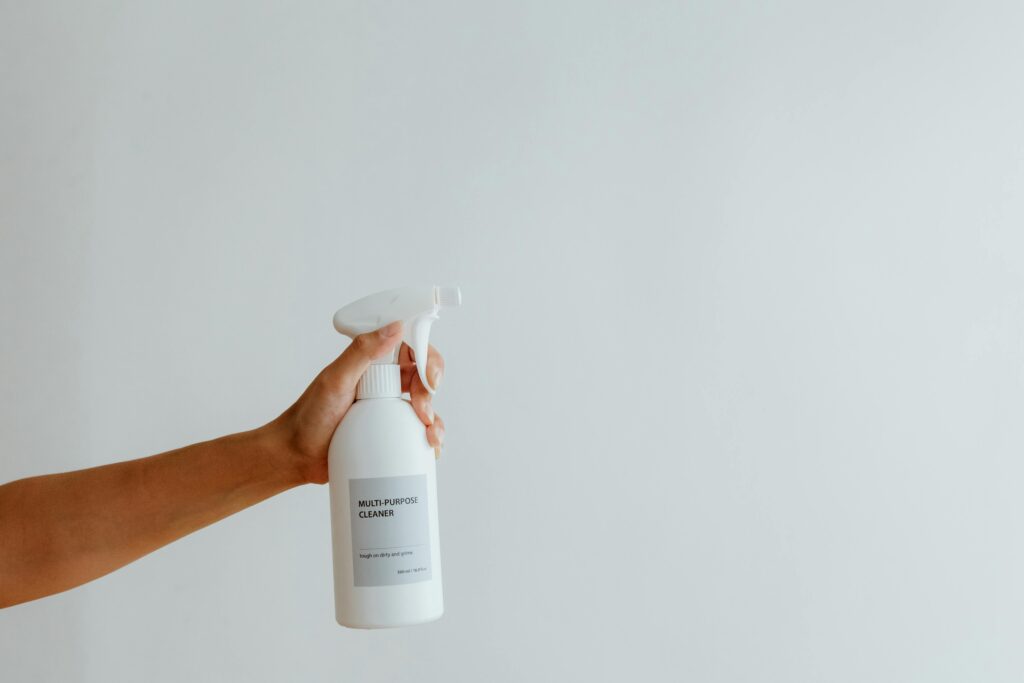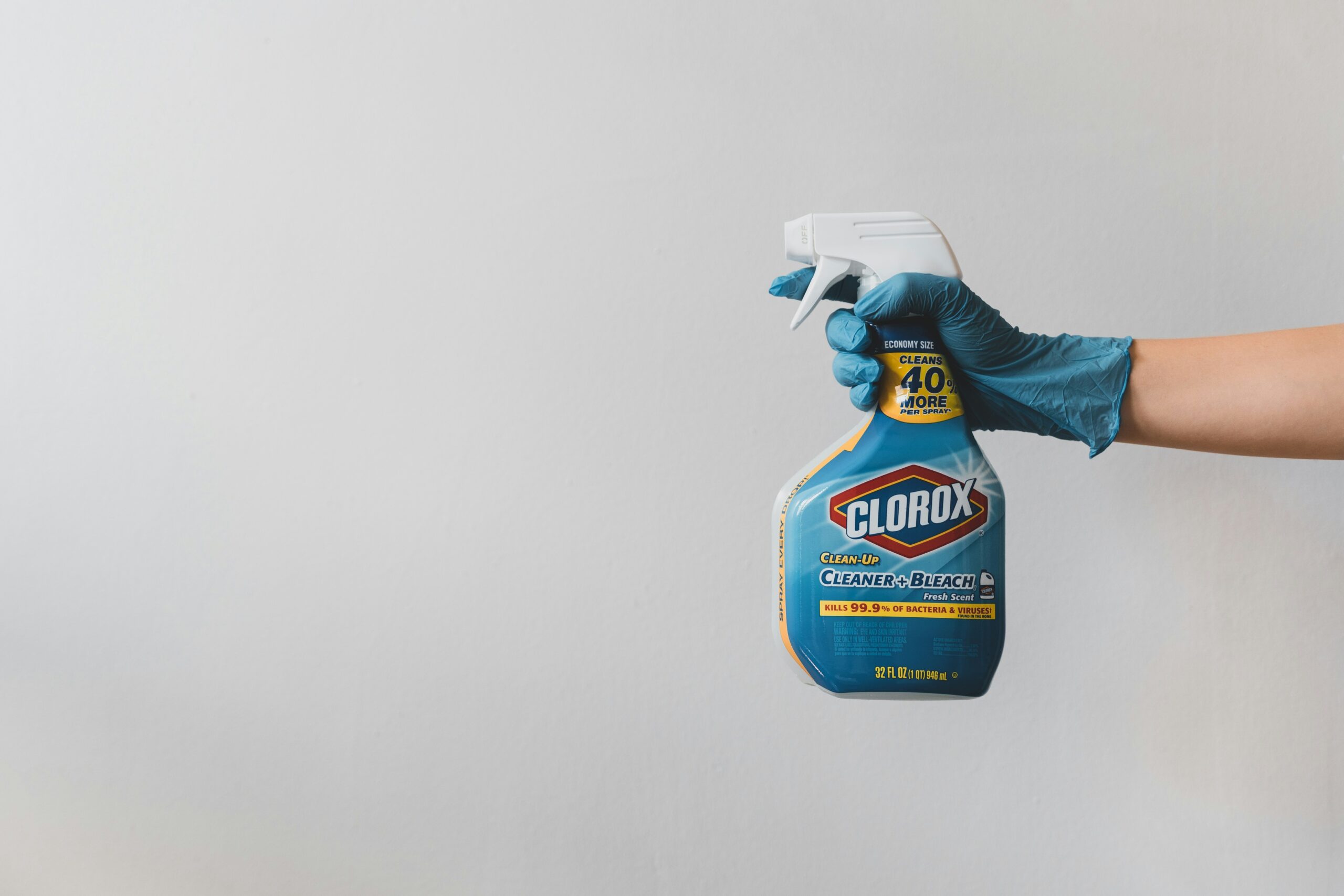Introduction
Household cleaners are meant to make our homes feel fresh and clean, but many contain hidden chemicals that can be harmful to our health, particularly those with autoimmune conditions. These toxic ingredients can disrupt the immune system, trigger inflammation, and worsen autoimmune symptoms. Being aware of the potentially harmful chemicals in your cleaners is the first step toward creating a healthier, safer home environment.
Table of Contents
Common Toxic Chemicals in Household Cleaners
Many everyday cleaning products contain chemicals designed to boost their effectiveness but pose potential risks to our health. Here are some common toxic ingredients to watch out for:
Ammonia: Ammonia is a harsh cleaning agent found in window cleaners. While not classified as a direct endocrine disruptor, ammonia exposure can irritate the respiratory system and disrupt overall immune function. Chronic exposure can lead to inflammation, making autoimmune conditions worse.

Bleach (Sodium Hypochlorite): often used as a disinfectant, bleach emits chlorine gas, which can irritate the eyes, skin, and respiratory system. Prolonged exposure can weaken immune function. Bleach, commonly used as a disinfectant, releases chlorine gas when mixed with other cleaners. This gas can interfere with thyroid function by impacting iodine absorption, essential for hormone production. Disruption of thyroid hormones can lead to fatigue, metabolism issues, and autoimmune thyroid diseases like Hashimoto’s.
Phthalates: Often added to cleaners for fragrance, phthalates can disrupt the endocrine system, potentially leading to hormone imbalances. Phthalates are often used to bind fragrances in cleaning products. These chemicals are well-known endocrine disruptors, affecting hormone balance, especially in the reproductive system. Phthalates have been linked to fertility issues, thyroid dysfunction, and exacerbation of autoimmune diseases.
Formaldehyde: Found in many disinfectants and air fresheners, formaldehyde is a known carcinogen and can exacerbate immune sensitivity. Found in disinfectants and some air fresheners, formaldehyde is classified as a carcinogen and can disrupt the immune system. Long-term exposure may trigger inflammation and worsen autoimmune conditions by interfering with immune response regulation. Each of these chemicals, commonly found in household products, can place chronic unnecessary stress on the body.
How Toxic Chemicals Affect Autoimmune Conditions
Here’s how the hidden dangers of household cleaners may impact those with autoimmune conditions:
Increased Inflammation: Many toxic chemicals are known to promote inflammation. For someone with an autoimmune condition, added inflammation can lead to more frequent flare-ups and worsening of symptoms.

Respiratory Irritation: Inhaling chemicals like bleach, ammonia, and formaldehyde may irritate the lungs and airways, triggering respiratory autoimmune responses and making conditions like asthma or chronic bronchitis harder to manage.
Hormone Disruption: Chemicals like phthalates and parabens interfere with hormones; which play a critical role in immune system regulation. Hormonal imbalances can further disrupt immune health and increase autoimmune sensitivity.
The Connection Between Chemical Exposure and Immune System Imbalance
Our immune systems are built to protect us from external threats, but regular exposure to harsh cleaning chemicals can place unnecessary stress on this system. Chemical exposure can disrupt the immune system and contribute to immune imbalance, increasing the risk of autoimmune diseases. Many harmful chemicals act as endocrine disruptors, interfering with hormone production and regulation.
For example, phthalates and BPA can alter thyroid function, impairing the body’s ability to manage inflammation and immune responses. Additionally; chemicals like formaldehyde and heavy metals can suppress immune function the body more vulnerable to infections. These toxins can also lead to oxidative stress, which damages cells and disrupts immune cell function. Moreover, chemicals may affect the gut microbiome, causing imbalances that trigger inflammatory responses and leaky gut syndrome, further exacerbating autoimmune conditions.
Over time, chronic exposure to these chemicals can lead to epigenetic changes, altering how immune-regulating genes are expressed and making the immune system more prone to dysfunction. Reducing exposure to such chemicals is crucial for maintaining a balanced and healthy immune system, especially for individuals with autoimmune conditions.

Safe Alternatives to Traditional Cleaners
When it comes to maintaining a clean home, choosing non-toxic cleaning options is essential for protecting your health and supporting immune system balance. Traditional cleaning products often contain harmful chemicals that can disrupt the body’s natural processes. Fortunately, many effective, natural alternatives, are available to help you keep your home spotless without compromising your health. From simple ingredients like vinegar and baking soda to eco-friendly commercial products, these options are safer for you, providing peace of mind while keeping your living space fresh and clean.
Homemade! is always the cheapest!
Vinegar: A natural disinfectant, vinegar can be used to, clean glass, countertops, and floors.
Baking Soda: Baking soda is effective for scrubbing surfaces and removing odors, making it a safe and versatile cleaning agent.
Essential Oils: Certain essential oils, such as tea tree oil and lemon, have antimicrobial properties and add a natural scent to homemade cleaners. Here’s a simple, effective recipe with vinegar, baking soda, and essential oils for a versatile, natural all-purpose cleaner.
DIY All-Purpose Cleaner Recipe
Ingredients
1 cup white vinegar (natural disinfectant)
1 cup water
1 tbsp baking soda (odor neutralizer and gentle abrasive)
10-15 drops essential oil (tea tree, lemon, or lavender work well for antimicrobial properties and scent)
Mix Ingredients:
In a large measuring cup, combine the vinegar and water.
Gradually add the baking soda slowly, as it will fizz when combined with vinegar.
Add Essential Oils:
Add 10-15 drops of your chosen essential oil(s) for added cleaning power and a pleasant scent.
Tea tree oil is excellent for its antimicrobial benefits, and lemon adds a fresh scent.
Transfer to Spray Bottle:
Pour the mixture into a spray bottle, ideally made of glass to avoid chemical leaching.
Shake gently to mix before each use.
How to Use
For Glass: Spray directly onto the glass and wipe with a microfiber cloth for a streak-free shine.
For Countertops and Floors: Spray onto the surface and wipe with a damp cloth.
For Scrubbing: Sprinkle baking soda on tough spots, spray with the vinegar mixture, let sit for a minute, then scrub with a sponge.
Quick Options!
Branch Basics: emphasizes ingredient transparency and simplicity, promoting a minimalist approach to cleaning that reduces toxic exposure and supports a healthier home environment. Their commitment to purity and effectiveness ensures a safely clean home without compromising your health or the environment.
Puracy: products are especially suitable for individuals with autoimmune conditions, allergies, or chemical sensitivities, as they help reduce exposure to irritants and potential endocrine disruptors. The brand emphasizes sustainability by using biodegradable formulas and recyclable packaging. Additionally, Puracy works with doctors and chemists to create products that are safe for your family and effective for everyday cleaning.
Seventh Generation: Their products are made with plant-based ingredients and are free from harsh chemicals like phthalates, parabens, synthetic fragrances, and chlorine bleach. Using safe, chemical-free products like these is essential for your health, as it reduces exposure to toxins that can disrupt hormones, irritate skin, and worsen symptoms for those with autoimmune conditions. Seventh Generation’s commitment to transparency and sustainability ensures their products support not only individual health but also the environment, with biodegradable formulas and recycled packaging

Tips for Reducing Household Cleaner Toxicity
Reducing the risks associated with household cleaners doesn’t require an all-or-nothing approach. Here are a few simple steps:
Ventilate Your Space: Open windows and doors while using any household cleaners to minimize inhalation of fumes.

Avoid Synthetic Fragrances: Look for fragrance-free products or those scented with natural essential oils, which are less likely to irritate the immune system.
These small adjustments can help create a cleaner, safer home environment and reduce the impact of household cleaners’ hidden dangers on autoimmune health.
Conclusion
The chemicals in household cleaners can impact more than just the cleanliness of your home—they can also disrupt immune function and trigger autoimmune symptoms. By recognizing the hidden dangers of household cleaners and making gradual changes to safer, non-toxic products, you can protect your health and support a balanced immune system. Small choices today can lead to lasting autoimmune wellness and overall health.
For more information: click here!




